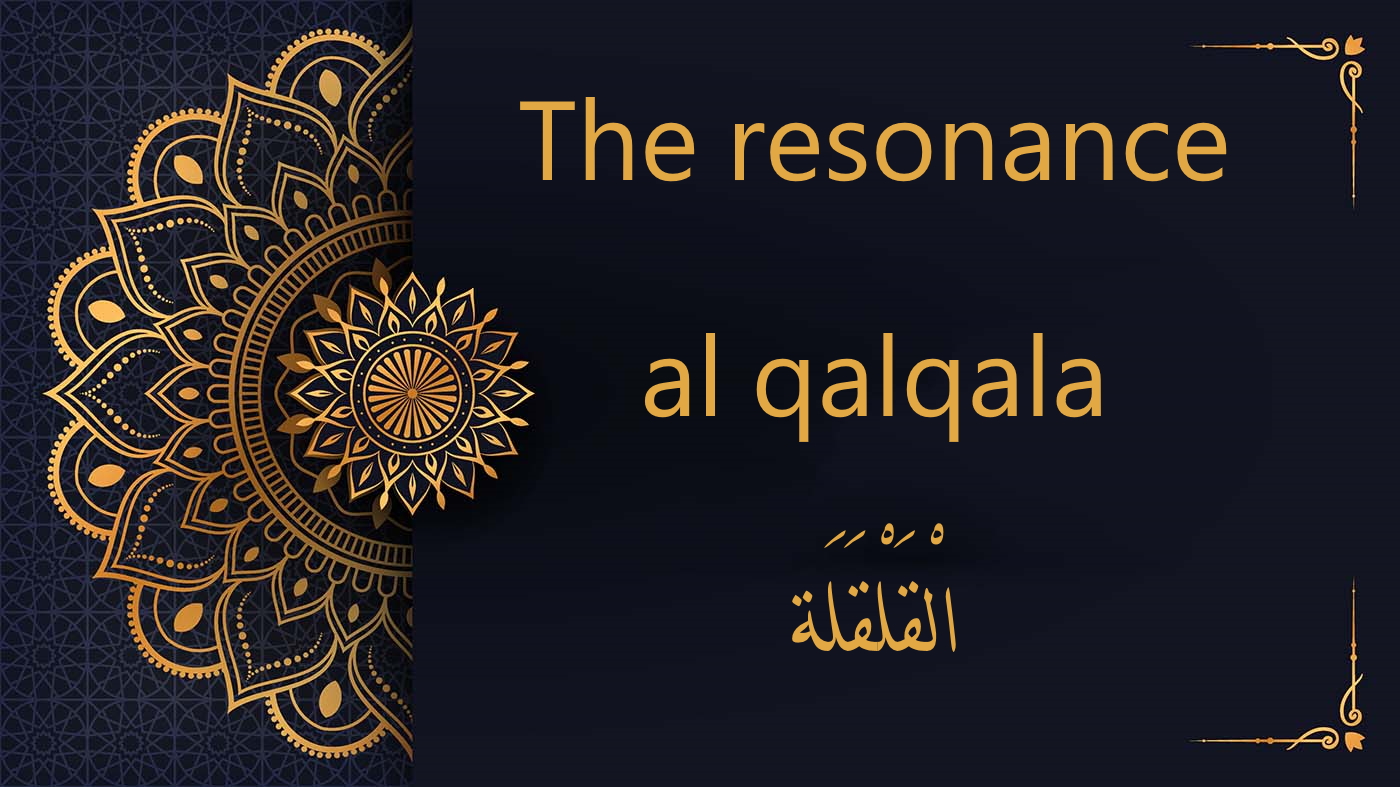
Unlocking Al-Qalqala: The Art of Resonance | Free Tajweed Rules Course
Qalqala: Resonance in Arabic Pronunciation
In the Arabic language, “qalqala” is a term that evokes a sense of restlessness, instability, and disturbance. Interestingly, this concept is not only linguistic but also acoustic in nature. Qalqala refers to a phenomenon that occurs with certain letters in the Arabic alphabet. When these letters bear either an original sukoon (indicating a natural lack of vowel) or a non-original sukoon (due to a grammatical judgment), they exhibit a distinct characteristic—a strong bounce or resonance.
This resonance, known as “qalqala,” serves a fundamental purpose in Arabic pronunciation. It enables listeners to distinguish these specific letters clearly, contributing to what is termed “tahqiq al-huruf,” or giving each letter its due in enunciation.
This phonetic rule of qalqala is applied by causing the letter to resonate at its point of articulation, without the addition of a vowel sound. Specifically, this rule is applied to the following five letters:
- د (Dal)
- ج (Jeem)
- ب (Ba)
- ط (Ta)
- ق (Qaf)
A helpful mnemonic to remember these letters is the sentence: “قُطُبُ جَدٍ” (Qutubu Jad).
Technically, when these letters bear a sukoon, they should be pronounced with a distinct resonance, ensuring that the sound produced emanates clearly from their point of articulation.
There are three categories of qalqala, each denoting the degree of resonance:
-
Small Resonance (Al-Qalqala Sughra): This category represents a subtle bounce or resonance in the pronunciation of the letter.
-
Average Resonance (Al-Qalqala Kubra): In this category, the resonance becomes more pronounced, creating a distinct vibrational effect in the letter’s pronunciation.
-
Great Resonance (Al-Qalqala Akbar): The highest degree of resonance, Al-Qalqala Akbar, results in a powerful bounce and a pronounced vibrational sound.
Understanding the nuances of qalqala is essential for achieving precise and eloquent Arabic pronunciation. It not only enriches the beauty of recitation but also ensures that the listener can discern each letter with clarity, thereby upholding the integrity of the Arabic language’s phonetic richness.
1. The Subtle Resonance: Al-Qalqala Sughra - الْقَلْقَلَةُ الصُّغْرَى
It manifests when one of the resonating letters remains unvoiced within a word, resulting in minimal vibration.
Example:
لَقَدْ خَلَقْنَا الْإِنسَانَ فِي أَحْسَنِ تَقْوِيمٍ
We have certainly created man in the best of stature; (95:4)
Alternatively, it can occur at the end of a word when followed immediately by the next word.
Example:
لَمْ يَلِدْ وَلَمْ يُولَدْ
He neither begets nor is born (112:3)
2. The Moderate Resonance: Al-Qalqala Kubra - الْقَلْقَلَةُ الْكُبْرَى
Al-Qalqala Kubra: The Notable Resonance at Word Endings
Al-Qalqala Kubra is a distinctive phonetic feature in Arabic pronunciation. It comes into play when resonating letters are found unvoiced at the end of a word, typically during a pause or a stop in speech.
In this scenario, the resonance of the letter becomes notably more pronounced compared to the subtle resonance of Al-Qalqala Sughra. The degree of vibration experienced in Al-Qalqala Kubra is medium in intensity.
This medium level of resonance adds depth and sonority to the Arabic language, making it an essential aspect of proper pronunciation and recitation. It’s important to recognize that Al-Qalqala Kubra occurs during brief pauses or at word endings, and mastering this linguistic subtlety enhances the beauty and clarity of spoken Arabic.
Example:
قُلْ هُوَ اللَّـهُ أَحَدٌ
Say, “He is Allah, [who is] One, (112:01)
3. The Profound Resonance: Al-Qalqala Akbar - الْقَلْقَلَةُ الْاَكْبَر
Al-Qalqala Akbar: The Intensified Resonance at Word Endings
Al-Qalqala Akbar represents the pinnacle of resonance in Arabic phonetics. This phenomenon occurs when a resonating letter is positioned at the end of a word, coinciding with a pause or a stop in speech, and is indicated by the presence of a shadda (diacritic doubling mark).
In such instances, the letter is articulated with a powerful and heightened resonance, emphasized further by the shadda. This results in a maximum degree of vibration, creating a profound acoustic impact.
Mastering Al-Qalqala Akbar is crucial for achieving eloquent Arabic pronunciation and ensuring that the richness of the language is fully expressed. It is a testament to the precision and depth of the Arabic phonetic system, adding both clarity and a distinctive musical quality to spoken Arabic.
Example:
تَبَّتْ يَدَا أَبِي لَهَبٍ وَتَبَّ
May the hands of Abu Lahab be ruined, and ruined, is he. (111:1)
Conclusion
This Tajweed rules lesson has concluded. Insha’Allah, the next lesson will cover the rules of the letter Ra ر.
At the Al-dirassa Institute, we provide an accessible path to mastering Tajweed under the guidance of skilled instructors. Should you wish to pursue this further, we warmly invite you to reach out to us.
Chosen and Trusted by Thousands of Satisfied Learners
Discover the experiences of our delighted clients who have thoroughly enjoyed utilizing this standout feature.
Alhamdulillah I‘m very pleased with the arabic and Qur’an lessons I receive from teacher Umm Tasneem and I‘m also content with the al-dirassa administration team who were very quick in answering any questions I had. In a month I progressed a lot and I cannot wait to continue my studies with al-dirassa. May Allah reward everyone at al-dirassa.
 Verified review - view original
Verified review - view original
My Qur’an teacher is fantastic, she teaches me in a loving and kind way where I look forward to the lessons and learn so much. My Arabic teacher is equally as nice and has a lot of patience with me, she has great expertise in the field and I’ve progressed really quickly with her. Thank you Al-dirassa!
 Verified review - view original
Verified review - view original
Book your free trial lesson
Don’t want to go through the translation anymore?
30 free minutes with your qualified Egyptian teacher.




